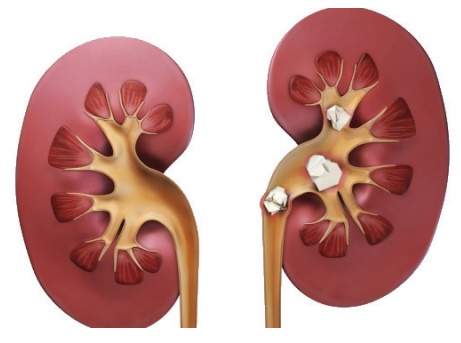Definition, Types, Causes, Signs and Symptoms, Diagnosis, management - Renal Stone/Renal Calculi / Urolithiasis | 12th Nursing : Chapter 2 : Medical Surgical and Applied Nursing Management Psychology of Human Diseases
Chapter: 12th Nursing : Chapter 2 : Medical Surgical and Applied Nursing Management Psychology of Human Diseases
Renal Stone/Renal Calculi / Urolithiasis
Renal Stone/Renal Calculi / Urolithiasis
A stone is a hard, solid mass that can form in the gallbladder,
bladder, and kidneys. Kidney stones usually originate in kidneys.
Definition
Urolithiasis refers to the presence of stone (Calculi) in the
urinary tract.
Incidence
It is associated with urinary tract infection.
Commonly seen between the age of 20 and 55yrs.
Types of kidney stones
•
Calcium stones: Are the most common type made of calcium
and oxalate.35-40%
•
Cystine stones: Are very rare 1-2%
•
Uric acid stones: Formed when urine is too acidic.5-8%
•
Struvite stones: Can happen when there is urinary tract
infections.10-15%
•
Upper urinary tract stones: That involve the renal pelvis and extend
into at least 2 calyces are classified as staghorn calculi

Causes
•
Genetic factors-- family history of kidney stones
•
Previous history of kidney stone.
•
Certain medications
•
Infection
•
Urinary stasis
•
Hyper Calcemia
•
Hypercalcuria
•
Diets that are high in protein and sodium but low in calcium
•
Sedentary lifestyle, obesity, pressure, immobility
•
Dehydration
•
Warm climate
Signs and Symptoms
•
Severe pain and is called renal colic.
•
Flank pain
•
Haematuria
•
Obstruction
•
Infection
•
Edema
•
Pyuria
•
Nausea and vomiting
•
Fever with chills
•
Frequent urination
•
Urinating small amounts of urine
•
Increased urge to urinate
Diagnosis
•
Health history
•
Physical examination.
•
24 hour urine test
•
Urography.
•
Blood tests for calcium, phosphorus, uric acid, electrolytes, urea
and nitrogen
•
Urinalysis to check for crystals, bacteria, blood, and white cells
•
Examination of passed stones to determine the type
•
KUB X-rays
•
Intravenous Pyelogram (IVP)
•
Ultrasound of the kidney
•
MRI of the abdomen and kidneys
•
Abdominal CT scan
Management
Medical management
•
Antispasmodic drug-relieves colic pain
•
Antibiotics-prevents infection
•
Narcotics-relieves pain
Surgical management
•
Cystoscopy: Scopic removal of stones
•
Lithotripsy-Extracorporeal shock wave lithotripsy (ESWL) uses
sound waves to break up large stones into smaller pieces and they pass through
the ureters in to the bladder.
•
Nephrectomy
•
Ureterolithotomy
Nursing Management
•
Increase the fluid intake of 3000 ml/day
•
Encourage Urination at frequent intervals
•
Avoid stone-forming foods like Beets, chocolate, spinach and colas
Related Topics